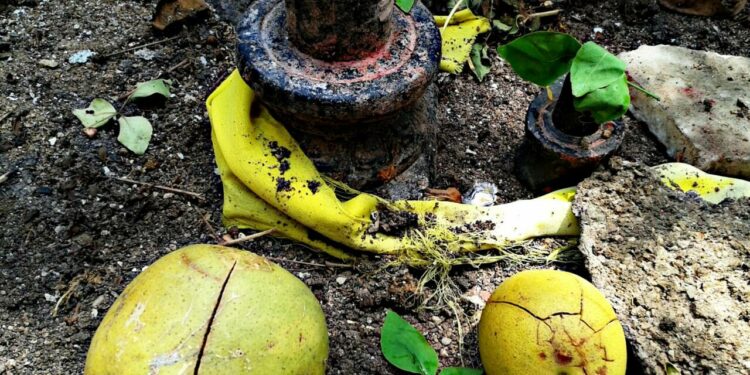The Bilwa plant is considered sacred and is closely associated with Lord Shiva. It is believed that Lord Shiva resides in the Bilwa tree, and offering Bilwa leaves to Lord Shiva is considered a way of seeking his blessings. The three leaves of the Bilwa are said to represent Lord Shiva’s three eyes, and it is said that the offering of Bilwa leaves on the Shivratri festival pleases Lord Shiva and brings his blessings. The fruit of the Bilwa tree is also considered a sacred offering and is offered to Lord Shiva during puja (worship).
Bilwa is also known as Bael and is a medicinal plant that has been used in traditional medicine in India for centuries. It belongs to the family Rutaceae and is native to India, Nepal, and other parts of Southeast Asia. The scientific name of the plant is Aegle marmelos, and it is known for its numerous health benefits.
The Bilwa tree is a deciduous tree that grows up to 15 meters in height. It has a straight trunk and spreading branches, with thorns on the branches. The leaves are 3-5 lobed and have a distinctive aroma when crushed. The fruit is round and about the size of a grapefruit, with a hard, woody shell that has to be cracked open to reveal the pulp.
Uses
The Bilwa plant is used in traditional medicine to treat a wide range of ailments, including diarrhea, dysentery, constipation, peptic ulcers, and respiratory infections. The leaves, fruit, and bark of the tree are used in various formulations of Ayurvedic medicine, and the fruit is considered a sacred offering to Lord Shiva in Hinduism.
Health Benefits
Digestive Health: Bilwa has been used for centuries to treat digestive issues like constipation, diarrhea, and dysentery. The leaves and fruit of the plant contain tannins, which have astringent properties and help to reduce inflammation in the intestines.
Respiratory Health: The Bilwa plant is effective in treating respiratory infections like bronchitis and asthma. The leaves and fruit of the plant have expectorant properties that help to clear the respiratory tract of phlegm and mucus.
Immune System: The Bilwa plant is rich in antioxidants, which help to boost the immune system and protect the body from free radical damage.
Cardiovascular Health: The Bilwa plant has been found to have cardioprotective properties. It helps to lower cholesterol levels and reduces the risk of heart disease.
Skin Health: The leaves and fruit of the Bilwa plant are used in traditional medicine to treat skin problems like eczema and psoriasis. The plant has anti-inflammatory and antibacterial properties that help to reduce inflammation and prevent infection.
How to use
The leaves, fruit, and bark of the Bilwa tree are used in traditional medicine. The fruit is usually consumed as a drink, made by blending the pulp with water and sugar. The leaves can be boiled in water and used as a tea, or they can be crushed and applied topically to treat skin conditions. The bark of the tree is also used in various formulations of Ayurvedic medicine.



















Discussion about this post